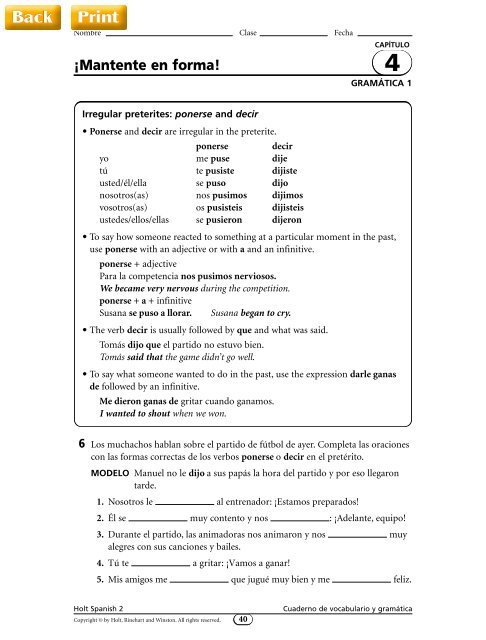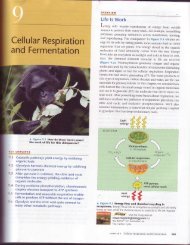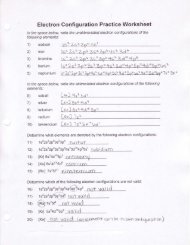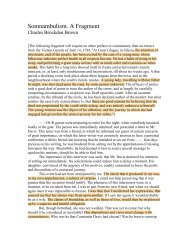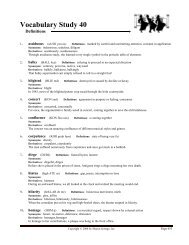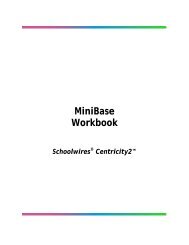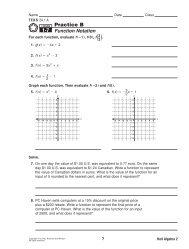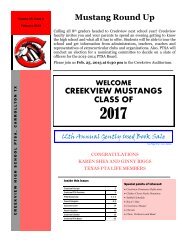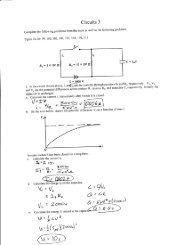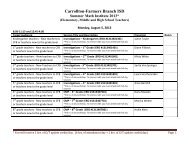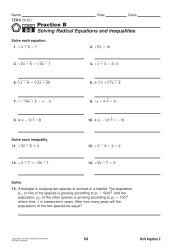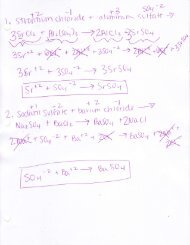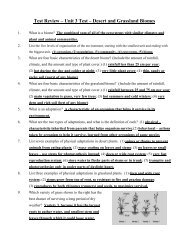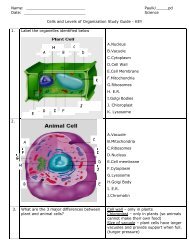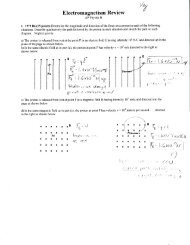¡Mantente en forma!
¡Mantente en forma!
¡Mantente en forma!
You also want an ePaper? Increase the reach of your titles
YUMPU automatically turns print PDFs into web optimized ePapers that Google loves.
Nombre Clase Fecha<br />
<strong>¡Mant<strong>en</strong>te</strong> <strong>en</strong> <strong>forma</strong>!<br />
Irregular preterites: ponerse and decir<br />
• Ponerse and decir are irregular in the preterite.<br />
ponerse decir<br />
yo me puse dije<br />
tú te pusiste dijiste<br />
usted/él/ella se puso dijo<br />
nosotros(as) nos pusimos dijimos<br />
vosotros(as) os pusisteis dijisteis<br />
ustedes/ellos/ellas se pusieron dijeron<br />
6 Los muchachos hablan sobre el partido de fútbol de ayer. Completa las oraciones<br />
con las <strong>forma</strong>s correctas de los verbos ponerse o decir <strong>en</strong> el pretérito.<br />
MODELO Manuel no le dijo a sus papás la hora del partido y por eso llegaron<br />
tarde.<br />
1. Nosotros le al <strong>en</strong>tr<strong>en</strong>ador: ¡Estamos preparados!<br />
2. Él se muy cont<strong>en</strong>to y nos : ¡Adelante, equipo!<br />
3. Durante el partido, las animadoras nos animaron y nos muy<br />
alegres con sus canciones y bailes.<br />
4. Tú te a gritar: ¡Vamos a ganar!<br />
CAPÍTULO<br />
GRAMÁTICA 1<br />
• To say how someone reacted to something at a particular mom<strong>en</strong>t in the past,<br />
use ponerse with an adjective or with a and an infinitive.<br />
ponerse + adjective<br />
Para la compet<strong>en</strong>cia nos pusimos nerviosos.<br />
We became very nervous during the competition.<br />
ponerse + a + infinitive<br />
Susana se puso a llorar. Susana began to cry.<br />
• The verb decir is usually followed by que and what was said.<br />
Tomás dijo que el partido no estuvo bi<strong>en</strong>.<br />
Tomás said that the game didn’t go well.<br />
• To say what someone wanted to do in the past, use the expression darle ganas<br />
de followed by an infinitive.<br />
Me dieron ganas de gritar cuando ganamos.<br />
I wanted to shout wh<strong>en</strong> we won.<br />
5. Mis amigos me que jugué muy bi<strong>en</strong> y me feliz.<br />
Holt Spanish 2 Cuaderno de vocabulario y gramática<br />
Copyright © by Holt, Rinehart and Winston. All rights reserved. 40<br />
4
Nombre Clase Fecha<br />
GRAMÁTICA 1<br />
The preterite of stem-changing -ir verbs<br />
• Verbs <strong>en</strong>ding in -ir that have a stem change in the pres<strong>en</strong>t t<strong>en</strong>se also have a<br />
stem change in the preterite t<strong>en</strong>se, but only in the third-person forms.<br />
e ➔ i s<strong>en</strong>tí sintió o ➔ u dormí durmió<br />
• Some verbs that fit this pattern are s<strong>en</strong>tir(se), dormir(se) (to fall asleep),<br />
preferir, seguir, divertirse (to have fun), morirse (to die) and vestirse.<br />
7 Ana y Rosa juegan a un juego. Ana dice una oración <strong>en</strong> pres<strong>en</strong>te y Rosa la escribe<br />
<strong>en</strong> pretérito. Escribe la parte de Rosa.<br />
1. ANA: Roberto se si<strong>en</strong>te bi<strong>en</strong> después de hacer ejercicio.<br />
ROSA:<br />
2. ANA: Me duermo tarde para estudiar muy bi<strong>en</strong>.<br />
ROSA:<br />
3. ANA: Ellos se diviert<strong>en</strong> <strong>en</strong> los partidos de básquetbol.<br />
ROSA:<br />
4. ANA: Mis amigas prefier<strong>en</strong> ser animadoras que jugar <strong>en</strong> el equipo.<br />
ROSA:<br />
8 Pon las sigui<strong>en</strong>tes palabras <strong>en</strong> ord<strong>en</strong> y escribe oraciones <strong>en</strong> el pretérito.<br />
1. equipo / ganando / todo / seguir /durante / el todo / mi / año<br />
2. yo / s<strong>en</strong>tirse / cansada / <strong>en</strong>tr<strong>en</strong>ami<strong>en</strong>to / <strong>en</strong> / el<br />
3. mis amigos y yo / reírse / compet<strong>en</strong>cia / patinaje / <strong>en</strong> / la/ de / mucho<br />
4. jugadores / no / vestirse / uniforme / con / los<br />
CAPÍTULO<br />
4<br />
• Wh<strong>en</strong> seguir is followed by a gerund, it means to continue doing something.<br />
Se hizo de noche y siguió llovi<strong>en</strong>do. Night fell and it continued raining.<br />
• In the preterite, some forms of reírse have an acc<strong>en</strong>t and some don’t. Note that<br />
the acc<strong>en</strong>ted í is pronounced as a separate syllable wh<strong>en</strong> it follows the e.<br />
yo me reí nosotros(as) nos reímos<br />
tú te reíste vosotros(as) os reísteis<br />
Ud./él/ella se rió Uds./ellos/ellas se rieron<br />
Holt Spanish 2 Cuaderno de vocabulario y gramática<br />
Copyright © by Holt, Rinehart and Winston. All rights reserved. 41
Nombre Clase Fecha<br />
GRAMÁTICA 1<br />
The preterite of ser and estar<br />
• Ser and estar are irregular in the preterite. The preterite forms of ser are the<br />
same as those of ir.<br />
ser estar<br />
yo fui estuve<br />
tú fuiste estuviste<br />
Ud./él/ella fue estuvo<br />
nosotros(as) fuimos estuvimos<br />
vosotros(as) fuisteis estuvisteis<br />
Uds./ellos/ellas fueron estuvieron<br />
9 Completa la conversación <strong>en</strong>tre dos <strong>en</strong>tr<strong>en</strong>adores sobre cómo les fue a sus<br />
equipos el mes pasado. Escribe la <strong>forma</strong> correcta de ser o estar <strong>en</strong> el pretérito.<br />
—El mes pasado (1) difícil para mi equipo. Nosotros<br />
(2) de viaje muchos días.<br />
—A nosotros nos (3) bastante bi<strong>en</strong>. Ganamos una compet<strong>en</strong>cia<br />
que (4) bu<strong>en</strong>ísima.<br />
—¿Dónde (5) Uds. el fin de semana pasado? La compet<strong>en</strong>cia<br />
(6) <strong>en</strong> Texas, ¿no?<br />
—Sí. Mi equipo y yo (7) <strong>en</strong> Houston por tres días y todo<br />
(8) increíble.<br />
—Entonces, (9) todo un éxito para ti y (10) fatal<br />
para nosotros.<br />
—Bu<strong>en</strong>o, los puntajes de nuestros equipos (11) difer<strong>en</strong>tes.<br />
CAPÍTULO<br />
4<br />
• Use the preterite of ser to say where an ev<strong>en</strong>t took place, how someone did, or<br />
what someone or something was like.<br />
El debate fue <strong>en</strong> el auditorio. Fue muy difícil, y a mí no me fue bi<strong>en</strong>.<br />
The debate was in the auditorium. It was very difficult, and I didn’t do very<br />
well.<br />
• Use the preterite of estar to say what your opinion of something was, where<br />
someone or something was, or how someone felt for a period of time.<br />
¿Cómo estuvo el exam<strong>en</strong> de español? How was the Spanish exam?<br />
Estuvieron <strong>en</strong> la biblioteca todo el día. They were in the library all day.<br />
Estuve <strong>en</strong>fermo toda la semana. I was sick all week.<br />
Holt Spanish 2 Cuaderno de vocabulario y gramática<br />
Copyright © by Holt, Rinehart and Winston. All rights reserved. 42


